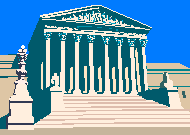|
|
�
Did Congress go Beyond its Enumerated Power in Extending (More) Copyright Protection? Decided January 15 Eldred v Ashcroft In Eldred, the Court upheld the constitutionality of the Copyright Term Extension Act of 1998 which extended by 20 years both existing copyrights and future copyrights. Under the law's provisions, works copyrighted in 1978 or later retain copyright protection for the duration of the author�s or artist�s life and through the next 70 years. Thanks, Mary! Congress has the authority, granted by Article I, section 8, to "promote the Progress of Science and useful Arts, by securing for limited Times to Authors and Inventors the exclusive Right to their respective Writings and Discoveries." The questions considered in this case: Does a 20 year extension on copyrights--the 11th extension passed by Congress in the past 40 years--promote scientific and artistic progress? More importantly, does the extension secure exclusive rights for a "limited time" or for a period of time that is quite significant? When does "limited time" reach its constitutional limit? The Federalist Five, interested, at times, in the limits of the Commerce Clause, showed themselves uninterested here in the limits of the Copyright provision. The Court ruled 7-2 that Congress deserves wide discretion when granting extensions, and "limited time," thanks to historical practice, merits a broad definition. Besides, Justice Ginsburg points out, the Bono Act encourages US/EU harmonization. Justice Breyer, despite his fondness for international norms, wasn't convinced. He notes, in dissent, the Founders' dislike of monopolistic behavior--copyrights and patents included. True, the Copyright Clause grants broad legislative power to Congress, but "that grant has limits." It was designed to promote the public good, not particular commercial interests. And unlike the majority, he agrees, with petitioner Eldred, that something more than economic protection is on the line. First Amendment values are at stake, and "What may count as rational where economic regulation is at issue is not necessarily rational where we focus on expression." Click here for the decision Click here for the DC Circuit's February 2001 decision
|
|||||||||||||||


